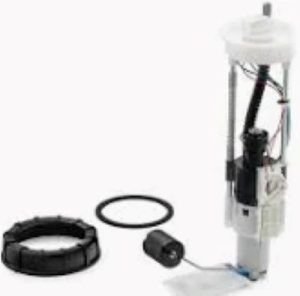The regular driving sounds are your usual humming noise which you hear from the fuel pump when you first turn on the ignition. This noise is the process of the pump priming/charging some pressure and sending fuel form the tank to the engine. But if the humming is too loud or lasts for more than a couple of seconds then it could mean that there are some serious problems.
Click To ListenNormal Priming Sound: The fuel pump will engage to build up pressure when you first turn the ignition into on position. This priming usually takes two to three seconds during which a gentle hum can be heard. If the pump hums and then stops after a few moments, and the car turns on as normal, that's a good thing.
Higher Decibel Levels From Wear: Internal fuel pump parts wear out over time. The bearings, brushes, and motor itself are included in this. As parts of the pump break down, the latter may start producing louder hums. The pump can still operate with this increased humming but constant humming is a sign that the pump could be on its last leg. For the most part most fuel pumps will last about 80k to 100k miles so if you think yours is getting close, now is the time to replace it.
Running a Little Low on Fuel: Over time, driving with little fuel puts added stress on the fuel pump and may produce a louder hum. The pump needs fuel to keep cool as well, and with less than a quarter-bowl full it can overheat or wear even faster. Pumping gas with over 1/4 of a tank can help this pump live longer, since that keeps the system from working so hard.

Blocked Fuel Filter- A dirty or clogged fuel filter may be to blame as well, this can restrict the amount of fuel flow causing the pump to work harder and produce more noise. Air filters typically need to be replaced every 15,000-30,000 miles. The pressure in the system increases due to a blocked filter, this induces louder pump operation and subsequently reduces overall efficiency.
Deformed fuel lines // If there are any obstructions and kinks in the fuel lines, this will require more push to have the pumped delivered to the engine hence a louder hum. Looking inside the fuel lines for clogs or harm will help maintain extensive put on around the gas push.
This activity led to a fuel pump overburden that was attributable to reason 15% of fuel pump replacements, according to the leading automotive solutions provider, in their 2020 report.
An ounce of prevention is worth a pound of cure. For routine maintenance, keeping fuel filters fresh, your gas tank full and staying on top of addressing odd noises can all help prevent you from needing a costly fuel pump repair.
If you hear constant humming or peculiar noises, check your pump out. Head to Fuel Pump for trustworthy, top-of-the-line solutions geared toward maintaining the performance of your ride.